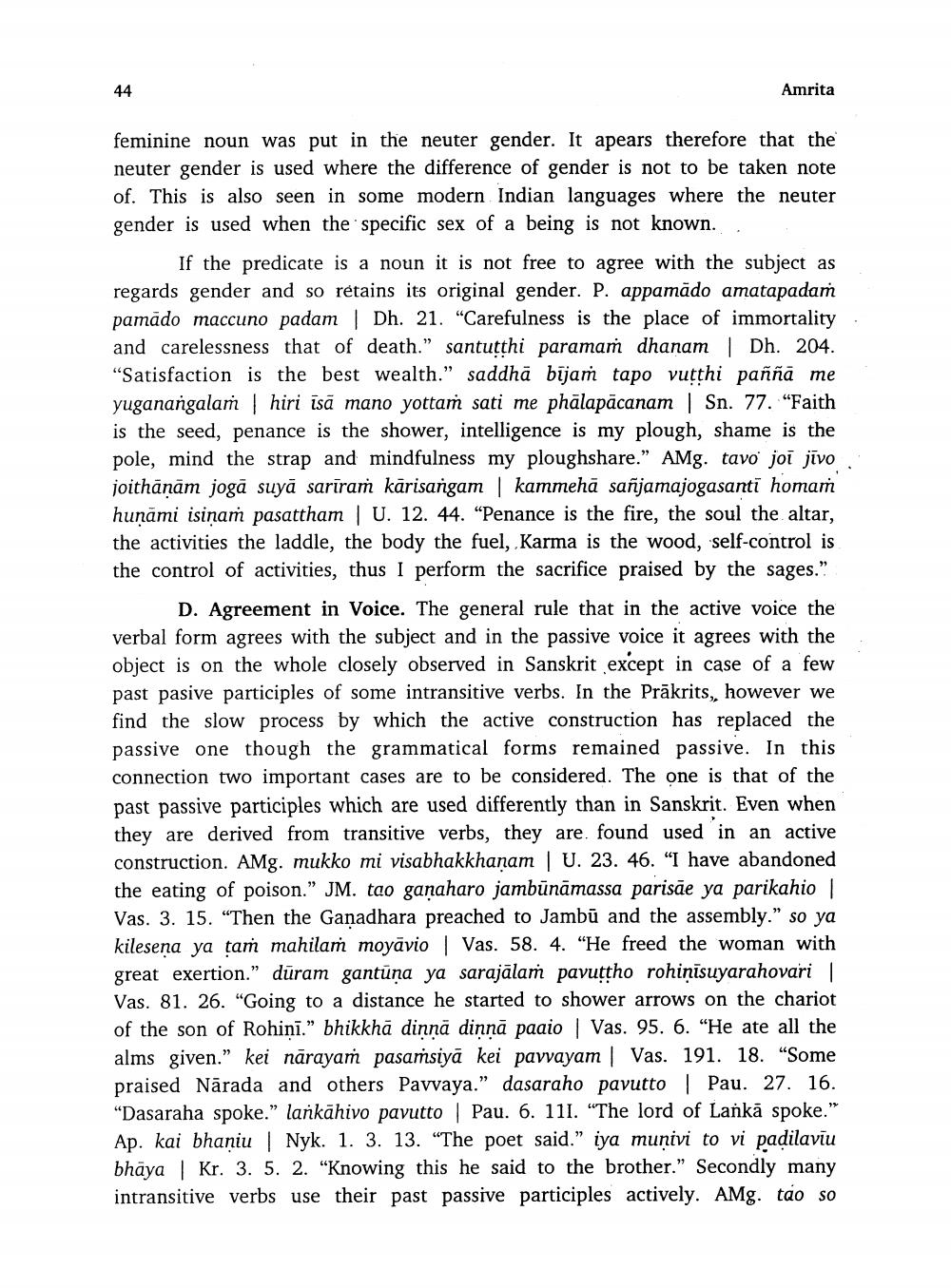________________
44
Amrita
feminine noun was put in the neuter gender. It apears therefore that the neuter gender is used where the difference of gender is not to be taken note of. This is also seen in some modern Indian languages where the neuter gender is used when the specific sex of a being is not known..
If the predicate is a noun it is not free to agree with the subject as regards gender and so retains its original gender. P. appamādo amatapadam pamado maccuno padam | Dh. 21. "Carefulness is the place of immortality and carelessness that of death." santutthi paramaṁ dhanam | Dh. 204. "Satisfaction is the best wealth.” saddhā bijaṁ tapo vutthi paññā me yuganangalam hiri isā mano yottam sati me phālapācanam | Sn. 77. "Faith is the seed, penance is the shower, intelligence is my plough, shame is the pole, mind the strap and mindfulness my ploughshare." AMg. tavo joi jivo joithānām jogā suyā sarīram kārisangam kammehā sañjamajogasanti homam hunami isinaṁ pasattham | U. 12. 44. "Penance is the fire, the soul the altar, the activities the laddle, the body the fuel, Karma is the wood, self-control is the control of activities, thus I perform the sacrifice praised by the sages."
D. Agreement in Voice. The general rule that in the active voice the verbal form agrees with the subject and in the passive voice it agrees with the object is on the whole closely observed in Sanskrit except in case of a few past pasive participles of some intransitive verbs. In the Prākrits, however we find the slow process by which the active construction has replaced the passive one though the grammatical forms remained passive. In this connection two important cases are to be considered. The one is that of the past passive participles which are used differently than in Sanskrit. Even when they are derived from transitive verbs, they are found used in an active construction. AMg. mukko mi visabhakkhanam | U. 23. 46. “I have abandoned the eating of poison." JM. tco ganaharo jambūnāmassa parisāe ya parikahio | Vas. 3. 15. “Then the Ganadhara preached to Jambū and the assembly." so ya kilesena ya tam mahilam moyavio Vas. 58. 4. "He freed the woman with great exertion.” dūram gantūna ya sarajālaṁ pavuttho rohinīsuyarahovari | Vas. 81. 26. "Going to a distance he started to shower arrows on the chariot of the son of Rohinī.” bhikkhā dinnā dinnā paaio | Vas. 95. 6. “He ate all the alms given.” kei nārayaṁ pasaṁsiyā kei pavvayam | Vas. 191. 18. “Some praised Närada and others Pavvaya.” dasaraho pavutto Pau. 27. 16. “Dasaraha spoke.” lankāhivo pavutto | Pau. 6. 111. “The lord of Lankā spoke." Ap. kai bhaniu | Nyk. 1. 3. 13. “The poet said." iya munivi to vi padilaviu bhāya | Kr. 3. 5. 2. "Knowing this he said to the brother.” Secondly many intransitive verbs use their past passive participles actively. AMg. tão so




